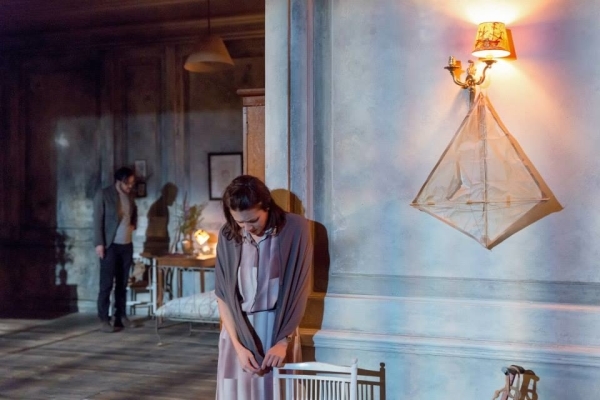The Cherry Orchard (Young Vic)
Katie Mitchell directs Simon Stephens adaptation of Chekhov’s classic

© Stephen Cummiskey
Well, it certainly doesn’t hang about: Chekhov’s cherry orchard has been scythed down below the two-hour mark by director Katie Mitchell and playwright Simon Stephens (using a literal translation by Helen Rappaport) in a livid, intemperate but eminently watchable cut-price version.
You never feel that the characters are living through their own upheavals as they jaggedly demonstrate their predicaments. The stateless, pathetic governess Charlotta, for instance, is played by Sarah Malin as a brusque bohemian who’s decided what to do, striding naked through the stage and leaping legs akimbo (now clothed) on the nearest male.
And the eternal student Trofimov’s great prophetic speech to the besotted Anya of Catrin Stewart is turned by Paul Hilton, admirably intense in specs and rough clothing, into a personal attack on her family. There is an element of that in the original but the emphasis is shifted. In a general flight from sentiment and nostalgia, Kate Duchêne‘s strikingly inelegant landowner Ranevskaya replaces blinkered self-absorption with an inappropriate low-grade, fussing vulgarity.
The acting, as often with Katie Mitchell, falls short of the European example she adopts. And there’s a crucial misunderstanding in James Farncombe‘s skilful lighting: for all the crafty silhouettes and shadows, beautifully composed, you can’t see faces properly. It wasn’t till the last act, when the triumphant, upwardly mobile serf Lophakin, who has bought the cherry orchard at auction to build holiday cottages, appears in a fuller stage light that I realised the actor who plays him was the admirable Dominic Rowan.
A detailed, thorough style of acting in this kind of serrated faux naturalism may not matter. But Hugh Skinner‘s Yepikhodov, defined by his squeaky boots and physical clumsiness, only squeaks and blunders at the top and bottom of the play. And Angus Wright‘s devoted, silly soul Gaev, celebrating the centenary of a book-case with a tribute and a kiss, squeezes in the wistful billiard ball vagaries with the air of a man who’s never been near a green baize table in his life. In off the red? More like a miscue, potting the white.
What is really good, however, is the sound and music of Gareth Fry and Paul Clark, seamlessly incorporating the mysterious thrum of the distant snapping of the mine cable, the approach of the Jewish musicians in a cloud of klezma and the buzz-saw cutting of the trees (none of that laughable lop-lop-lop effect you usually get).
The costumes are indeterminate modern era, and that’s another problem: what’s actually happening in Eastern Europe today is the reclamation of land by the Ranevskayas after the collapse of Communism; they themselves are the new Lophakins, voluntarily turning their own estates into tourist destinations. The prophetic power, and political metaphor of the play, is diminished by neutral updating.
This leaves the old servant, Firs, who’s seen them all come and go, in a trickily ambiguous position. Gawn Grainger plays him as a bent-double muttering retainer. He’s literally a downstairs punch bag, as when Tom Mothersdale‘s sneery Yasha (impatient for Paris) kicks him hard in the googlies. But when he’s left alone at the end, he finds his voice, and it’s the evening’s finest moment; even though you can’t see his face.
Catherine Love met with director Katie Mitchell last week, you can read the full interview here.












